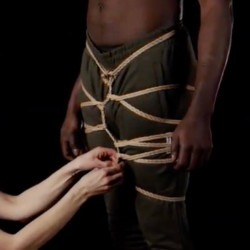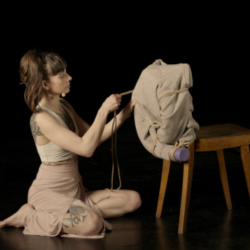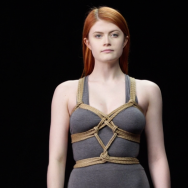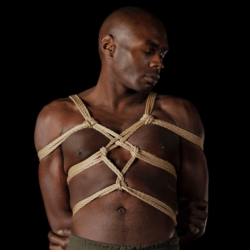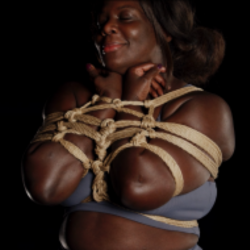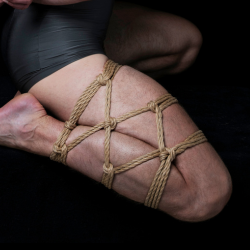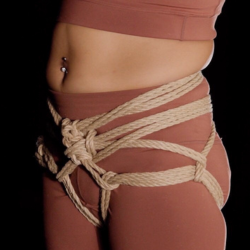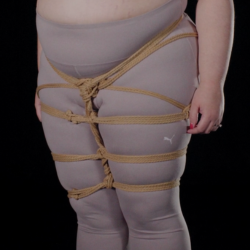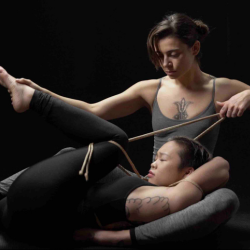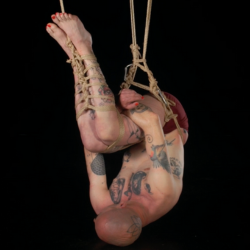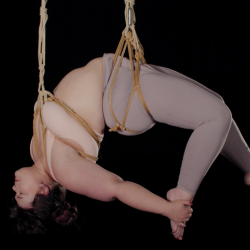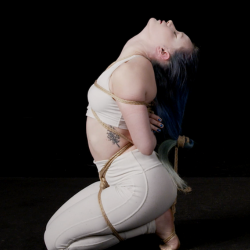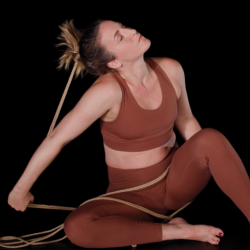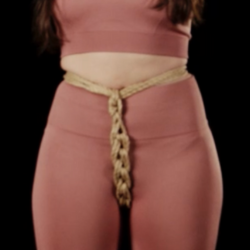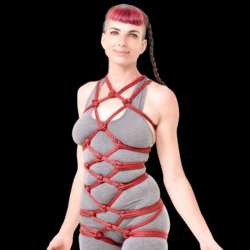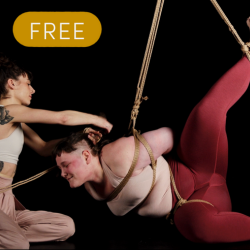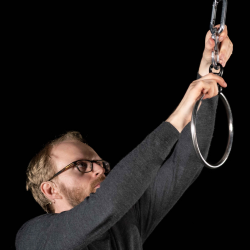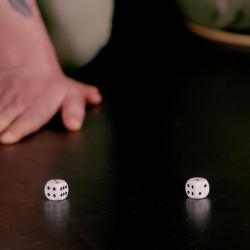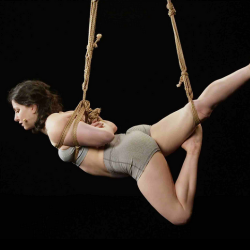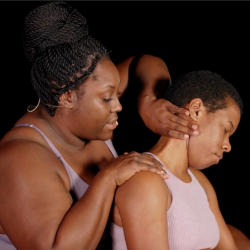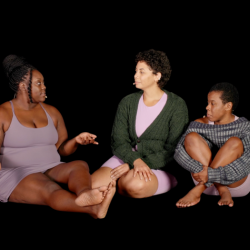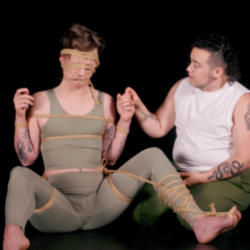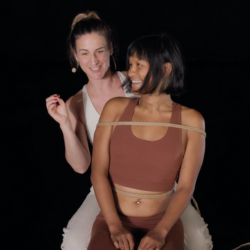EP 42
MYA AND FOX (from ROPE PODCAST)
Emphasizing authenticity over universal appeal, Fox and Maya aim to attract like-minded listeners who appreciate their genuine approach. Together, they share their rope journey with us, discussing the challenges of producing their long-running podcast, the balance between creativity and consistency, and their insights on integrating values and philosophy into their practice.

Fox (a rope top) and Mya (a rope bottom) have been rope partners for 8 years, and since 2017 have explored their passion for the psychology and motivations behind the topic on the Rope Podcast.
Instagram: @ropepodcast
[00:00:08] Wicked Wren Greetings to all my guys, gals and non-binary pals. Welcome to the Shibari Study Podcast. I'm your host Wicked Wren. Shibari Study is an online learning resource offering video tutorials for beginners through advanced practitioners. Whether you're brand new to the world of Shibari and needing to learn the basics, or a seasoned rigger or rope bottom seeking inspiration to push your practice to new places, there's something for you at shibaristudy.com. Today, I have a really awesome episode. I have on Fox and Maya. Fox uses he/him pronouns, and Maya uses she/her pronouns. They are a married couple and they started the Rope Podcast. It's a really awesome podcast about rope bondage. Everyone should check it out. I'm super excited to talk to both of you today. How are you?
[00:00:56] Fox Hi Wren, it is such a pleasure and honor to be on your podcast today.
[00:01:02] Mya For sure. For sure it is. This is very exciting. We've listened to all your episodes, and we love the, the rising tide lifts all boats.
[00:01:11] Wicked Wren Yes! Well, it's funny to hear your voices because I'm used to hearing them on your podcast because obviously, I am also a fan of it.
[00:01:19] Fox It's nice to have a, you know, a colleague in you that we can have water cooler talk with because we don't have many rope bondage podcast host colleagues we can just chat about work with. So that's a great connection for us.
[00:01:32] Wicked Wren Yeah. The, the water cooler is really small.
[00:01:35] Mya Yeah. You and […] basically.
[00:01:38] Fox Yeah, essentially.
[00:01:38] Wicked Wren Yeah. Exactly. We need to make a little group for all of us to, to chat about stuff.
[00:01:43] Fox Brilliant.
[00:01:45] Wicked Wren So you were talking earlier and you said you're both really into D&D.
[00:01:50] Fox Yes, we are. And Maya is trying really hard to get into the whole roleplay thing. But the thing is, she cannot, for the life of her play anything else than a Lawful Good character.
[00:02:02] Mya Cannot.
[00:02:02] Fox And she's tried really hard. Like maybe one day she might be able to make an incursion to neutral good, but like so far, anything else of any lawful good character is impossible for her to play to the extent that she will not take proficiency in the deception skill because she thinks it's morally objectionable.
[00:02:22] Mya I can't, I just can't. And when I when I tried, I just never used it. Never used it at all... It's even stealth. It was a bit uncomfortable.
[00:02:31] Fox Even lying to a goblin makes her feel bad for a week.
[00:02:34] Wicked Wren Oh Maya, you do look like the most trustworthy person I've ever met in my entire life.
[00:02:40] Fox And she is.
[00:02:41] Wicked Wren I will say.
[00:02:42] Mya I try. I try.
[00:02:45] Fox Yeah. And another funny detail is currently she's a cleric of Ilmater, and the symbol for Ilmater in the Forgotten Realms is like a pair of hands tied with rope.
[00:02:54] Wicked Wren Oh my God, that's amazing.
[00:02:56] Mya And it was an accident.
[00:02:57] Fox It was completely by accident. And obviously, it was hilarious because we're playing with people who are vanilla and don't know the rope bondage side of things. And when we open the book and so the sigil for her gonna be like, Yeah, okay, that happened.
[00:03:10] Wicked Wren So Maya, I have a question. You seem like a rule follower. And you're also intensely in the rope bondage scene. How did those two things play together?
[00:03:22] Mya I think that is a great question. So I follow the rules that I think are important, but I also think a lot about morality. I did partly philosophy is my degree. Psychology is what my profession is. And so thinking about stuff is really important to me. And so when I make a decision, I try really hard to make a conscious decision. Like being in an open relationship. Like looking at what normal, in inverted commas, is. And making a decision about 'is that something that I want to do, or is it not'. And once I decide, I think I'm pretty consistent, would you say?
[00:04:00] Fox I would say you're extremely consistent.
[00:04:02] Mya Yeah. And it's important to me to, to honor the values that we have. In fact, some of my favorite episodes have been on the values, the rope values that we did.
[00:04:12] Wicked Wren Was literally about to bring that up. It's a great episode. It's a really great episode.
[00:04:19] Mya I have a little thing about values. And in fact, we have personal value, we have relationship values, and we have rope values. So they're all things that we try and live our lives by.
[00:04:32] Fox Do you want to explain real quick what ACT is? Because I think it's relevant that some of the listeners might find it useful.
[00:04:37] Mya Okay. So ACT is acceptance and commitment therapy, which is a type of therapeutic practice and values are at the heart of it. And I, I was going to say I got into it. I got taught it in chronic pain school, which I went to about 15 years ago, cause I have chronic, chronic pain after a car accident, and it was– it's all about living a life from values.
[00:05:02] Fox And for people like us, Wren, who are kinky, who are queer, who are all matters of things that part of society might not accept, I think it's really useful to move our locus of validation from being external, which is we look at other people to validate us to moving it back to being internal and defining our values and validating ourselves as long as we live by those values we've chosen define ourselves.
[00:05:29] Mya Which is not to say we don't mess up. Let's just be clear. Like we're–
[00:05:33] Fox Yeah, I mess up a bunch.
[00:05:34] Mya We are very much human beings who mess up all the time, but that's the kind of basis and repair work is based on values. So does that make sense?
[00:05:45] Wicked Wren Absolutely. Fox, you were saying something about making sure that you were doing something for yourself and not to feed your ego kind of. Do you, do you ever have check-ins where you think to yourself, Am I doing this for me, or am I doing this for someone else?
[00:06:03] Fox So that's super interesting, Wren. Because at the moment I am at a turning point in my rope practice where I want to make it more about my partners and finding a way for them to express what they want and what gives them pleasure in rope, and in becoming a rigger that is better at focusing on my partner's needs and serving those needs. For me, that's very alive at the moment, that question.
[00:06:34] Wicked Wren That's awesome. I think that that's something really important for everyone to do. I want to also comment on something that happened when we were just doing our early interview, just to get ready for the podcast. You two were both really excited and talking. And then Fox, you leaned over and then grabbed a hang of rope and then called it the talking stick. And throughout this, you've been handing it back and forth. It's really cool. I really love it. Where did that come from?
[00:07:08] Fox Yeah, that's born of six years of trying to edit footage of us talking over each other. And so we had to come up with some way to try to not talk over each other as much. So my life editing the podcast would be less miserable. Because, unlike you, I'm not a pro at this and yeah, when, like trying to de-intertwine tracks of us talking at the same time, especially when we have a guest in addition, has been a bit of a nightmare, so we try to come up with little tips and tricks to make our lives easier.
[00:07:41] Mya And the thing about the rope is, it's soft. If you have something hard. We discovered early on, like a pencil. If you put it down on the desk, then you have to edit that noise out.
[00:07:49] Fox Yeah. The clanging.
[00:07:51] Wicked Wren Also, I want to comment you've done over 150 episodes since 2017. I think you're pros. You haven't missed a single one. You're pros.
[00:08:03] Fox We haven't missed a single one yet, but I must say, the pressure is a constant in our life to always have an episode ready to go, and that can be challenging sometimes when we're having, let's say, a very heavy work week or we're having a mental health struggle or something like that. There's always this deadline of every other Monday we need to have an episode ready to go out. And for example, yesterday we had to record one, like a bit... Not maybe in a rush, but we've definitely some real pressure because one needs to come out on Monday and we didn't have one ready to slot in the programming for this season. And yeah, it's worth it. But it's also sometimes a struggle to keep up. So far we've managed. And since we've added doing photoshoots for the covers, that's another piece of pressure. We have the audio part to produce, but also we are trying to make an original nice photograph for every single episode. And that adds a bit to the, the time, the time crunch.
[00:09:07] Mya And I think the challenge with the photos is we are quite keen on, or we very much enjoy doing philosophical episodes like values and risk, things like that. And actually, they can be quite hard to think about what picture you're gonna put to represent what our values involve.
[00:09:26] Fox Nihilism in rope was the cover photo for that.
[00:09:29] Mya Feedback in rope. Rituals was a good on. Rituals is one of my favorite covers. That was an easier one. But yeah, the covers can be a challenge. We're quite good– at the beginning of the year, we spend a lot of time, like mapping out the year. We think about who are interviewees might be. Yeah, we're that kind of people.
[00:09:49] Wicked Wren Amazing.
[00:09:50] Mya We come up with a giant list of topics, but this year we had a few interviewees who, who dropped out and some challenges. And so we didn't, we, I think next year we need to over plan. This is my opinion. And that will give us a bit more of run time. But I will say one of the funny things about the podcast is when we started, it was Fox's idea and I said, But what will we find to talk about?
[00:10:18] Fox And I laughed. I laughed so hard when she said that.
[00:10:21] Mya I was like, But we'll do like five episodes and then we'll run out of stuff. And we have such a giant list of topics that we don't think that will be a problem now.
[00:10:30] Wicked Wren Yeah, exactly. I want to talk more about the podcast specifically in a little bit. But first, I would love to talk about how you met, how you two found rope bondage. I just want to hear more specifically if you would like to talk about your marriage and how having that kind of partnership and also producing a podcast together and doing rope bondage.
[00:10:53] Fox How we met first.
[00:10:55] Mya It was my first ever kink party.
[00:10:58] Fox And my first everything party also.
[00:11:00] Mya It was both tops and bottoms who could put their services up for auction. And the money went to domestic abuse charity. And at the beginning nobody wanted because there was a lot of bottoms and none of the bottoms wanted to be first. So they were all like anxious and panicky, you know, no thanks. And someone, Fox was like, I don't mind going first. And so he got up and he was kind of showing his, his rope, and then he needed a...
[00:11:30] Fox Demo bottom.
[00:11:30] Mya A demo bottom, and this was my first kink party, and I was with three of my friends, and I was determined to be braver than normal because I'm not a very brave person. And so I put up my hand to be the demo bottom. And then they started the bidding and no one bids. And I was like, why is no one bidding? And so again, in my be brave moment, I bid and then it started.
[00:11:57] Wicked Wren And then you got married.
[00:11:58] Fox Yeah, so basically, she took pity on me and I was like, Okay, well finally someone will have me. I should definitely marry that woman. And that's how it went.
[00:12:05] Wicked Wren Yeah, stick around. Okay. So you went to your first kink party. You're with your friends. Are you still friends of those people?
[00:12:14] Mya I am, but they are spread all over the place now. So one is in Berlin, one is in France, and one I'm not quite sure where she is. So they were, so they've kind of spread out around the world.
[00:12:28] Fox And, that's one thing about Thailand actually. That can be a challenge sometimes, is people don't tend to stay here for very long. Like on average, if you make a good friend or a play partner here, you can expect them to be here for 2 or 3 years maximum and then usually move on to somewhere else. And so you have to get used to this life of people coming in and out of your life all the time. You don't have as much stability.
[00:12:52] Wicked Wren Why? Why is that?
[00:12:55] Mya Because there's a lot of expats in the community. So Thailand as itself, as a country, is still relatively conservative and the Thai BDSM community is amazing and growing. And thankfully we're able to participate in that because Fox speaks Thai. So we're very lucky to be able to engage with that, and that gives us more stability. But the expat community is an expat community. People come and go.
[00:13:21] Fox Yeah, usually they'll be sent by their company for a posting, or they'll be coming to study something for a degree. And when they get that degree, they move on to somewhere else. And even the Thai people we interact with, a lot of them are interested in going to work abroad or to study abroad. So usually they will find an opportunity and then leave the country. So our, our life has fewer people we can act as anchors in a more longterm fashion.
[00:13:50] Wicked Wren Got it. And were you nervous to go to that party in the beginning?
[00:13:55] Mya Oh my God, so nervous, so nervous. I was so, yeah, completely. Because I lived– at the time, I lived in like a really small town in the north of the country. And so first of all, I was coming to the big city, Bangkok, which was a bit scary to me then. And I haven't even been in Thailand... I don't know, six months, a year? Not very long. And so coming to Bangkok was a big deal in itself. Coming to a party was a big deal. Yeah, for me, I was super nervous.
[00:14:26] Wicked Wren Were you nervous, Fox?
[00:14:28] Fox No, I was excited. We have a slightly different personality, Maya and I, and when she gave me some personality test things, I ended up scoring the highest a person can possibly score on the extrovert scale. So the idea of going to a place with a bunch of people and doing a live demo of my rope skills, even though I had no rope skills at the time, I was very relaxed with all of that.
[00:14:55] Wicked Wren Do you think that's why you two get along so well?
[00:14:59] Fox That's possibly quite part of it. We are very complementary in, in the way we are and the way we behave, and we can definitely shore up the weaknesses in each other in a way that means we work together very well.
[00:15:14] Mya Yeah. And I think the power exchange, we have a power exchange relationship and have done... It's evolved over time, but it's 24/7 now. And I think for me, as a slightly anxious, quite anxious person, I think it can be really helpful to have someone who is supportive but also able to make decisions and help me out when I'm perhaps on the more anxious side.
[00:15:39] Wicked Wren That makes total sense. Do you feel like rope bondage and performing in public and being tied in groups, dungeons and things like that, even doing your podcast, do you think that's helped you with some anxiety? Has it made you more outgoing?
[00:15:58] Mya Okay. Great question. I think it's helped. So I'm the sort of person who's anxious but tries to do things anyway. And so I would say Fox is definitely, let's call it, encouraged me to do things I would never have considered in a million years beforehand. And so I think that's helpful. And to be fair, I think sometimes I gently pull him back from doing things that maybe go further than we want to go, because we try and keep our identities to ourselves. We have other jobs, this kind of thing.
[00:16:37] Wicked Wren That was my next question was that if you leveled him out in a way.
[00:16:43] Fox I think, I think she does. I think we average out between the two of us. And that's probably a good thing to be a bit more middle of the road, rather than being one extreme or the other all the time.
[00:16:55] Mya Yeah.
[00:16:56] Wicked Wren So... Go on. Sorry.
[00:16:58] Mya I was just going to say that was one of our earlier personality differences that I'm very all about the grays. And, Fox was very like black or white.
[00:17:09] Fox Yeah, very binary.
[00:17:10] Mya Very binary. And so that was a really interesting discussion for us to have around... Well, all the things basically about, well, what does it mean to be black or white in this situation? What does it mean to be more in the middle?
[00:17:23] Wicked Wren Yeah. Fox, how long were you doing rope before you met Maya?
[00:17:30] Fox I think I did rope around one year before we met, but I had mostly tied my gym equipment at that point. The first year of rope for me was mostly tying furniture and self-tying and self-suspending in order to figure things out because I did not want to endanger another person. So I would rather put myself in those suspensions when I wasn't yet 100% confident in my applying lock-offs and things like that. And so when we met, I had tied maybe 1 or 2 other persons, but not very many.
[00:18:09] Mya Yeah. Two, two people. So one of them was your partner at the time. And she got you into it, really.
[00:18:20] Fox She did.
[00:18:20] Mya Yeah. So we're very grateful to her for that. And, for me, up in the north of Thailand, I had gone to some rope jams, but they were super basic. There was a rigger there who was actually quite experienced, who's passed away now, from America. And so I went to some of his jams, but I really had very little experience of being tied.
[00:18:45] Fox And that same rigger from America, who was Rigger Mortis from the Chicago community and the Cram for people who still know that from way back, who was one of the founders of ShibariCon in the US. He's also the person who taught me rope, so interestingly, independently of each other, we were both introduced to rope through the same rigger, who moved to Thailand from the US.
[00:19:08] Wicked Wren Wow.
[00:19:09] Mya He was a character.
[00:19:10] Wicked Wren So, yeah, it sounds like you two grew together in a lot of ways. What is your rope style like? What do you like to do?
[00:19:18] Fox Okay, so we each have our rope values, which we use to define our style. I'm gonna let Maya answer first and then I'll talk about mine.
[00:19:26] Mya So, we actually have values that are prior to rope, as well as our personal lives. So mine are connective. So that's the importance of being in relationship to the other human being that I'm tying with. So I don't just tie with anyone. I'm someone who is probably trying to find the right connection with the person I tie with. Diversity. So for me, it's important, or I want to be able to tie with lots of different types of people in all different ways, whether that's personality or the more traditional diversity aspects. Experiential. So I want to try and be in the moment. I'm someone who's very in my head, and one of the huge benefits of rope for me is being in rope and remembering to actually focus on the rope and not to be somewhere else. And then, joy. I want to have fun. I want to enjoy it. And, and that can be pain. That can be pleasure. That can be sexy times. Joy comes in lots of ways, but that's my fourth one.
[00:20:31] Fox As for me, I could not resist the temptation to make all four of my values start with the same letter. So they are slow, sensual, sustainable and sexy. And to explain a bit what I mean by that slow is pretty self-evident. I like to tie really slowly. I'm not the kind of person who's like, I can tie a TK in 45 seconds. I have, like zero interest in that. I'm the kind of person who will put on the first two wraps of a chest harness and then spend two minutes caressing my partner's skin, or playing with their hair or breathing with them. And then I would like, super slowly do my next two wraps, which means it might take me an hour to do a chest harness, which can be fun if the partner I'm with is into that. That kind of very experimental rope. It doesn't make me a very good rope performer as a result as you can imagine. I really like to take my time. Sensual means I really like to use all five of my senses while I tie. And I try also to provide an experience for the five senses for the person I'm tying. So a lot of things like dragging rope across the skin, using all the parts of my body to stimulate my partner's body, caring about what I smell like, what my rope smells like, maybe breathing into my partner's ear or talking to my partner while I'm tying them this sort of thing. Sustainable because I like to use rope for either play or photoshoots, and in both cases, having a lot of airtime is useful. If I'm doing a photoshoot and I tie my suspension in a way that the model can stay in it for 30 minutes, that means I have 30 minutes to arrange every single aspect of my lighting of my camera settings and really get the shot I want to get. And if I have 30 minutes of airtime for play, I mean, that means I get to have sex in rope for 30 minutes instead for 45 seconds. And for me, that's a lot more pleasurable and satisfying. So I try to design my rope system so that it's possible for most people to stay in my suspension for a really long time. And that will include things that can shock some purists. Like I always tie the hands last, for instance. Whereas in a lot of rope education you get the advice, you should tie the hands first because of headspace and so on. But hands tend to be the thing that get numb or that gets uncomfortable the soonest, the quickest. And so by tying them last, I give myself more time in the scene. And lastly, sexy. I want to tie rope in a way that highlights my partner's beauty. And I'm not so much interested in things like humiliation or degradation or things like rope on the face that like, deforms the face and so on. That's not so much my vibe. I'm more seeing rope as... Lingerie almost, as a fashion accessory I use to enhance and bring out the natural beauty of my partner. So those would be my four rope values.
[00:23:53] Wicked Wren How often do your values change? Do they ever change? Have they ever changed?
[00:24:00] Fox For my rope values, they have not changed since I defined them, what? Two years ago? Something like that. My personal values in my personal life interestingly change a lot more often than that.
[00:24:12] Mya Yeah, and I think the same for me. I think my values are able to cover quite a lot. And so they still feel right at the moment. But that's not, I would be very open to them changing if life changed.
[00:24:28] Fox And one thing that's important for us to state is, rope values are not a judgment we emit on other people's rope. This is us expressing what we like, but we absolutely validate the fact that other people like different things. And for instance, my rope is not very sadistic, but I respect a lot people who use rope in a sadistic way and enjoy that. I'm just saying, this is what I like, and it's completely okay for you to like something different.
[00:24:59] Mya And we tie with other people a good amount. And so for me, for example, I like sadistic rope, I like transitions, which, Fox is less interested in. And so I have another partner where I can do those kind of activities with. So I think that we were also able to connect with other people and do a lot with them and then bring that back to us and also bring what we've learned together to those other people.
[00:25:28] Wicked Wren That's one of the coolest things about rope is you can connect with different people in different ways, and it doesn't have to be everything.
[00:25:36] Fox Yeah.
[00:25:36] Wicked Wren I want to talk about how someone can do a value sheet for themself, because I think it's really, really cool. But before we talk about that; Fox, you said that your tying style makes you a bad performer because you'll put on a TK for an hour. But you're really extroverted. So my question is, do you like to perform? Do you perform? Do you like being in front of people and having people watch you and stuff?
[00:26:09] Fox I do prefer to tie in private most of the time, but I have performed and it's more something that I make myself do in order to get better at it. And we recently did a fairly high profile performance in a bar, where it was like a proper poster with our names on it, and people paid tickets to come see us do rope on a stage. Like that's the closest we got to a public rope performance. And I did enjoy it. And the way I reconcile my very slow tying with making a performance I was interesting is I actually pre-tied all of my harnesses on my backstage, then dressed her up over in the rope, and then did a big burlesque-style reveal where I ripped off her clothes and she had all the harnesses already on. And so onstage, I only did, the up lines and a lot of moving her body in a ton of different positions, and people kind of seemed to love it.
[00:27:08] Mya So what I would say is from the outside, Fox is a super creative person, and I think he does get energy from tying in public, whereas for me, it's more draining, which is not to say I don't enjoy it. But we're also careful about doing that because of our personas. Like we perform with masks on and we try to keep ourselves private. I think when we tie in front of our friends at dungeons, like, we did a scene on Saturday and we were, you know, at a dungeon party. That's quite fun. If the crowd feels like our friends and we know them and we feel comfortable, I think when it's a new crowd of people or people where you're not sure, then I think it's more uncomfortable.
[00:27:58] Wicked Wren I feel the same way. I like suffering in rope, and it's really annoying when you're in front of a crowd that really has no idea what's going on. And something... For instance, I was at Folsom and I was being tied. It was a hard sequence, and I finally was in a single futo and the crowd would nod and I was thinking to myself, this is the break. This is the best relief I could get right now. I'm so happy for this single futo, but everyone else thought it was amazing. But they didn't understand the waist rope that I had that was cutting in half. Those kinds of things. But when I'm in front of my friends, it adds so much because they get it and I love being witnessed in that way. That's so fun for me.
[00:28:45] Mya I have a bit of a thing about when people say, Oh, you look so peaceful and serene.
[00:28:50] Wicked Wren I know.
[00:28:51] Mya And I'm dying. I'm dying inside.
[00:28:52] Fox That futo looks so dreamy.
[00:28:55] Mya Dreamy. Yeah...
[00:28:55] Mya I know.
[00:28:59] Fox Rope suspension hurts. Like, try it and you'll see how much.
[00:29:02] Wicked Wren Yeah, it hurts a lot. I would love for you both to give me some tactile tips. Some steps people can take to do a value audit on what they want out of rope. How do you start that process?
[00:29:22] Fox So I have two suggestions with regards to that. The first one is we have an episode about rope intentions.
[00:29:30] Wicked Wren Perfect.
[00:29:31] Fox And I created a model with 12 possible intentions that seem to cover what's most commonly the interest of people in rope bondage. And I'm not claiming it's absolutely the end all be all exhaustive list of possible reasons to do rope, but it seems to cover most people pretty well. So if you sort of, sort of define yourself on that radar of 12 possible axes, and people are usually a mix of them. Like someone might be five out of ten sexual and three out of ten sadistic and eight out of ten artistic, for instance. That's going to help you probably see what you want out of rope bondage. And another thing I really insist on is feedback after rope sessions with your partner. And that's one of the things I love about Shibari Study, by the way, is very often when you have an educational content with two partners tying, there will be a video at the end where they debrief together their scene, and both the top and the bottom get to talk about what they experience in that tie. I think that is so important. And also by doing this feedback process and this debrief process with your rope partners, you should over time gain better understanding about rope, what rope is to you. And that's the way for me to go about defining your values. Like if this scene really worked for me, why did I really enjoy this one more than last Thursday's one?
[00:31:06] Mya So I'll come at it from a more psychology perspective. So first of all, what is a value? It's just something that is important to you. So sometimes the word value has connotations with people, which are stressful. It doesn't need to be. It just means what is important to you. And so rope values are what is important to you in rope. And so that's a great place to start. We do mind maps to explore stuff so you can make a big list of all the things that you've experienced in rope, and then you can prioritize them so you can compare one to another. So say, artistic versus sexy. Okay, which one am I going to prioritize? And by that way, you can kind of move to the top the ones that are most important to you. And that gives you a good idea of what's important to you. And we suggest, well, the research suggests four values is sufficient. I don't have 20 values because it's really hard to live by 20 values, whereas four values is, is okay.
[00:32:07] Wicked Wren Less is more. This question might not be answerable. It's a very hard question, but a lot of times out their scenes, tops will ask bottoms, How was it? And the bottom says, It was great. And that's where it ends. Do you have any thoughts on calibrated questions to ask? How do you get a dialog going?
[00:32:30] Fox So first of all, don't be sorry. I love that question. I'm very happy to try to answer it.
[00:32:35] Wicked Wren Good luck.
[00:32:36] Fox I will try to rise up to this challenge. What I would do personally in my rope practice is I will try to ask more specific questions than how was it. And ask questions like, What were your top three favorite things and your worst three least favorite things about that scene, which forces people, to the extent that they consent to answer, to think about it a bit harder. Or questions like, in this suspension, what was the bottleneck? What would be the first thing that would make you tap out if you tried to stay in it as long as you possibly can? Would it be the hip rope that would become the problem faster, or would it be the futo, or would it be the grav boot? Or would it be the fact that I'm hitting you with a baseball bat the whole time?
[00:33:23] Mya And this is what I do professionally for a living, coaching.
[00:33:28] Fox Hitting people with a baseball bat?
[00:33:30] Mya No, no. Coaching. Like, the kind of...
[00:33:33] Fox I mean she's small, but she packs a punch. Believe me.
[00:33:35] Wicked Wren She can hit. She can hit.
[00:33:38] Mya Yeah. So giving feedback is is quite an important part of what I do. I would start with the open question of what went well and what could we do differently next time. Like those are two more specific but very open questions that you can start with. And then it's also good to remind bottoms to ask tops what they enjoyed. So I think it is very common, as you say, for a top to say to the bottom like what did how did it go for you? I think it's less common, in my experience, for bottoms to ask tops. And I think actually making sure that the feedback is, what would you call it, bi-directional, like? It goes both ways.
[00:34:18] Fox It's a two-way street.
[00:34:19] Mya A two– yeah. Is really important because as a bottom... Often bottoms, I'm speaking from my experience, are very keen to please. Like they want to do a good job, right? That's probably part of a lot of bottom psyches. And so understanding better what's actually going to work for the top I think is really important.
[00:34:42] Fox Yeah. It's, it's impossible. Almost impossible for a top to progress in your rope skills if you don't have quality feedback from a bottom. Like having a bottom able to communicate good feedback is one of the biggest blessings you could ever find as a rope top, I feel.
[00:35:02] Wicked Wren Yeah. I agree. I just want to make a comment that you two are so intentional about everything you're doing, and I want to talk about why you've done the Rope podcast. What hole you think it fills. But before that. I'm in a really sadistic rope. I want to be hurt. I want to feel like I barely made it up the hill. And you're describing a rope style that's totally opposite than that. But since you're so clear on what your intentions are in rope, I would tie with you. Because you're so clear about what you're into. And I think a lot of people are not clear, and they want to appease many. And that actually hurts. Whereas now I can make a decision like, I know Fox Maya are about.
[00:35:53] Fox So first of all, thank you. Second of all, come to Thailand and I would be delighted to tie with you. And you'll see that Thailand is a lovely country, the greater shibari destination vacation place. And third, my philosophy of that is that it's better to be authentic and good at one thing, and then you will attract the people who want that thing. And you won't please everyone but the people who choose you because of what you authentically are about will really like it. Than to try to be everything to everyone, which is a mission that is destined to fail.
[00:36:33] Wicked Wren I agree.
[00:36:34] Mya I think from the bottom perspective that's quite interesting because I like a lot of different styles of rope. So I'm clear and intentional about what my values are, but they cover a lot of ground, whereas Fox's value is a bit more specific to the type of rope he likes. And what I find is that I tend to select out partners more based on actual ties. So for example, I don't tie a TK. I won't be tied in a TK. Because I want longevity in rope, and my experience is that the TK is the most, relatively most risky part of rope.
[00:37:14] Wicked Wren Yes.
[00:37:14] Mya And some might just want, want to do that. So if they just say, Well, I only tie TKs. And then we part ways. Like, that's not the rigger for me. So it's a different approach to selecting in, selecting out tying partners.
[00:37:26] Wicked Wren Also, if someone says "I only tie TKs", that's probably a red flag. Let's be honest.
[00:37:33] Fox I would agree. But you would be surprised the number of times we've experienced that, or even people who would say to Mya, either that she's a fool for not having TKs in a risk profile, like we had a very unpleasant interaction with a rigger one time around that. Or they say, Oh, but you haven't been tied in my TK. Because I am a Nawashi master who studied from a Japanese made video for 15 years. And my TK is not dangerous. It's only the bad peoples' TKs that are dangerous. So we get, we get a lot of that.
[00:38:08] Wicked Wren This is kind of a different conversation, but it is difficult because everything is so TK focused.
[00:38:14] Fox I have a book coming out next month, hopefully, it's in the printing presses right now. In which I present 60 different suspension positions, and not a single one of them uses a TK. So I can present proof that you can do at least 60 different full suspensions without using it.
[00:38:35] Wicked Wren I love it. Mya. Knowing your background, knowing the kinds of things that you work in, are there ways that we can give feedback... More positively or more negatively? I guess what I'm asking is, are there ways to present feedback in ways that are going to be helpful versus hurtful?
[00:39:00] Mya Absolutely. There's probably two suggestions that I would make. The first one is to talk about "I". So the feedback is coming from you. So I felt, not you were. That's a really, really big one. You were a terrible top. It's not great feedback.
[00:39:17] Fox But I feel you were a terrible top, is much better.
[00:39:20] Wicked Wren We're gonna cut that out everybody.
[00:39:24] Mya I, I felt, in the chest harness, some pain in my left shoulder, and the rope was a bit tight there. And so next time, it would help me if we made that rope less tight. So "I" statement is first, and the second is to talk about the person's behavior, not them as a person. So so again I am a... You are a terrible rope top, that's assigning characteristics to the person. Whereas, when you tie the futo you caught the skin of my thigh and it pinched quite badly. And it was super uncomfortable, is about the person's behavior. So those would be my two top tips.
[00:40:08] Fox And obviously, if you have a concrete behavior being fed back to you, it's really easy to change that and being more careful about the futo next time. Whereas if the feedback you get is, you're a shit rigger, well what are you going to do about that?
[00:40:21] Wicked Wren Nothing. That doesn't help us. Everyone, you can't see the video. I can. But Mya is putting her hands in her head right now.
[00:40:31] Fox That's because I said a bad word.
[00:40:33] Wicked Wren I love it.
[00:40:34] Fox And she's getting very red also, which you cannot hear on the radio.
[00:40:37] Wicked Wren Nobody can, you know. We can imagine it.
[00:40:41] Fox Isn't she the cutest thing ever, though? Right?
[00:40:43] Wicked Wren I spend a lot of my time blushing on the podcast, so that has been an experience for sure. Like we can never do television because I would just be pink all the time.
[00:40:54] Wicked Wren I love it. Speaking of the podcast, why did you start it? What hole did you feel like it filled?
[00:41:01] Fox Okay, so after I started knowing my way about, around rope a little bit better, I felt I had to give back to the community in some way. Because this guy, Rigger Mortis, taught me so selflessly, and he didn't charge me any money to do that. And basically he made me into the rope top that I am today, and I felt I wanted to pay that forward in some fashion. And at first I thought, Well, I'm going to do the same thing he did. I'm going to teach rope to people for free. And I did that for a little while, and it was horrible for me. I rediscovered that I hate being the teacher. It's really not my calling at all. And after each teaching session, I would have the worst splitting headaches and like, my whole body was like, No, you can't, you can't do that. This is not the thing for you. So I was like, okay, teaching is off. What else can I do that might be helpful or at least entertaining to the rope community, to give back in some way. And that's how the podcast was born.
[00:42:09] Wicked Wren Bam!
[00:42:11] Mya Yeah. And I was like, You're bonkers. How are we going to do that? And then it turned out, we, we really could through mind maps and persistence. But he's grown a lot. Like, if you listen to our early episodes versus now, I think we've, we've we've developed a great deal.
[00:42:27] Fox Yeah. We found, we found our voice as we were doing it, which I guess is mostly always how it happens.
[00:42:33] Wicked Wren Yeah, I listen to my early episodes, or rather, I haven't listened to them because I won't, because it's just so hard to hear. Luckily I did it with–
[00:42:44] Fox It's like looking at pictures of rope you tied five years ago, and you're like, How.
[00:42:48] Wicked Wren Yes, yes.
[00:42:49] Mya I think the other thing that it enabled us to do, is connect with a broader, wide rope community. So we're in Bangkok, as you said, in Thailand, and we don't have access certainly before Covid and the online stuff became so prevalent. We don't have access to the American scene, to the European scene, we really don't know very much about it at all. And so what this has given us is the ability to reach out to some incredible rope people and interview them. And we do this for love. Like, this is a spare time thing where we try and have a Patreon to cover some of our costs, but mostly it's for love. But it's given us such incredible experiences, it's completely worth doing for me.
[00:43:38] Mya Yeah. Who were your early podcast influences?
[00:43:42] Fox Well, we would be amiss if we didn't mention Graydancer who had a podcast about rope bondage for years. And his style was a bit different from ours, but obviously it was a huge influence to see that it was possible to make a podcast about rope. And I think the time we started more or less coincided with when with a time when he stopped. And so it was sort of a fairly natural continuation, even though maybe not a fully intentional one. And we did interview years later Graydancer on our podcast. And he was like, Wow, I was so delighted that some people, like, picked up the torch. And that's the nicest thing you could have said. Like having this sort of lineage from his rope podcast to our rope podcast and now having you join the family. So yeah, like the big rope podcasters family is alive and strong.
[00:44:37] Wicked Wren Maya, you said something about chronic pain early on.
[00:44:41] Mya Yeah. So I have chronic pain, endometriosis, a hip problem, Crohn's disease. And I think there might be something else, but basically, I have this little collection of low lying, ongoing chronic health issues which are extremely annoying. And I did ACT as part of my learning to live with these, these things that are part of who I am. And I think Fox has handled them really well because obviously I bring them to our rope. We've done a couple of episodes on chronic pain, and they have been some of the most vulnerable, but also, I think some of the most important that we've done in terms of some of my value around diversity, I really think that everyone can do rope. And for me, coming into it with chronic pain, it can make a big difference in, in terms of helping.
[00:45:43] Fox In terms of message, which is really important for us to say that you do not have to be a 20 year old cis female who weighs half what my left arm weighs in order to be able to do rope. We're both over the age of 40. We both have several chronic health issues. And yet in the book I mentioned earlier, which is 60 very difficult suspensions, Maya, modeled for every single one of them. And so this is another proof that rope is accessible if you make it accessible. If you think about it, and if you have the open mind to tie people who might not be the stereotypical rope bottom, it is actually very much possible to achieve those things.
[00:46:30] Mya And I think time helps. So that would be another thing that I would say. So, I've been doing rope for maybe nine years. So both of us did rope for maybe a year before we met each other. And we've been together eight years. And if I think about my first year, like the first single futo that I did, I thought I was going to die. I was like, how do people do this? I just don't understand. But now I'm not a lover of single futos. I'm a double futo person.
[00:46:57] Wicked Wren Same.
[00:46:57] Mya So, very different for me. And that is both of us developing, like, both my ability to bottom–
[00:47:05] Fox And my futo.
[00:47:06] Mya And his first futo, like, that we used. Did not work great. And I think that's such an important message for people. We, we see these incredible photos and we think, Oh, I must be able to do that immediately. And it's wrong. Like it takes years.
[00:47:20] Fox And for me that really ties in that sustain, sustainable value I mentioned earlier, because I wanted my futo to be as sustainable as I could make it, and I literally spent weeks tuning the pattern of my futo and suspending myself from a single futo from our bed, until I found one that was sustainable for me, and I'm someone who hates feeling pain, so if it's sustainable for me, it's going to be more sustainable for most people.
[00:47:47] Wicked Wren That's a really good point to bring up, because rope bottoms - we get photos. We say, We want to do that. But we don't think about the actual tie that's happening a lot of the times. And you bringing up that your futo got better, Fox, and more sustainable, that's something that we don't even think about, really.
[00:48:09] Mya I had a rigger that I tied with, probably four years into my rope experience who did a single futo on me that was really difficult.
[00:48:23] Fox Excruciating.
[00:48:24] Mya Excruciating. Yeah. And I couldn't hold it, and I had to come down. And afterwards he said to me the words, Oh, I thought you are an experienced rope bottom, which honestly crushed me. And then I came home and showed the photos to Fox, and we looked at the tie. And we dissected the tie. And we realized that in all honesty, it wasn't a great futo, and we could see where the problems were. And I think as a rope bottom, you know, every futo is not the same. Not at all. So that's an experience I share.
[00:48:59] Fox Yeah. And another similar experience, is a person who came to me saying, I tried being suspended in a vertical. It's horrible. I can never be suspended in a vertical. And she showed me the tie that she was in that was horrible for her, and she couldn't breathe, and she thought she was going to die. And I said, You know, I feel I can put you in a vertical and you'll be okay. And she tentatively tried it, and we just engineered a tie that was appropriate to her body. And she was fine, and she loved it. And she felt really healed and empowered. That actually, she wasn't a broken person who can't do verticals. She just needed someone who was attentive to her needs and tied it in a way that was sustainable for her.
[00:49:39] Wicked Wren Yeah. Well, I could keep talking to both of you forever. You're a wealth of knowledge. Well, we're going to have another episode. That's the thing. What's on the horizon?
[00:49:52] Fox So the big thing for me is the book that's coming out. It will be my first book, and I've recently moved to doing rope full time, so that allows me to do more elaborate projects like that. I think I spent now two years and a half working on that book. So the idea of it being finished and me reclaiming my free time, it's going to be incredible. Like, what am I going to do with all the free time now that I'm not going to spend 4 to 6 hours every day working on it.
[00:50:18] Wicked Wren It's probably going to be rope. You're probably just going to do rope. Let's be honest.
[00:50:22] Fox I kind of want to go back to tying people more than I have the time to do that, yeah.
[00:50:26] Mya For me, my current interest is longevity in rope. So as Fox said, we're both over 40. I'm a curvy bottom. I have chronic health issues, as we said, and I'm super interested in how the community, and how I personally, can keep going as a rope bottom. Because I just thought that rope has been around long enough for us to have great models of being an older rope bottom.
[00:50:59] Fox And then as far as the podcast, it's going to be Christmas time soon, and for Christmas, we do something special that we love, which is throughout the year. We ask each person we interview to describe for us their favorite rope scene or one of their favorite rope scenes at least and we do a big compilation episode of that every Christmas. So it's a bunch of like super amazing rope people describing and telling the story of their favorite rope times, and it's like muah. It's a delight to listen to on Christmas morning.
[00:51:28] Mya That was very French.
[00:51:30] Wicked Wren I love that.
[00:51:32] Fox It is.
[00:51:33] Wicked Wren What a beautiful episode. Well, thank you both for being on so much. I mean, this is awesome. Wealth of knowledge.
[00:51:40] Fox Thank you Wren. It was Great.
[00:51:43] Mya Thank you so much. Thank you.
[00:51:44] Mya You're welcome!


